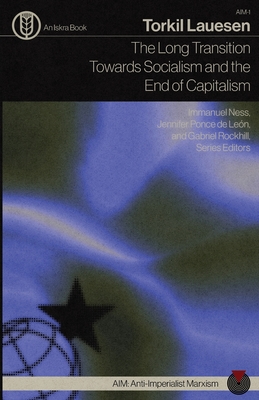
The Long Transition Towards Socialism and the End of Capitalism is the latest work from renowned revolutionary Torkil Lauesen, whose decades of activism and scholarship have made him a leading voice in global anti-imperialist movements. Drawing on his deep involvement in revolutionary struggles, Lauesen offers a comprehensive analysis of socialism's long, unfolding transition. By examining pivotal moments-from the 1848 revolutions to China's market reforms-Lauesen reframes these struggles not as isolated failures but as integral steps in the global shift away from the capitalist world-system. For those committed to socialist theory and anti-imperialism, The Long Transition provides essential insights into how the decline of capitalism and the rise of a global counter-hegemonies offer new opportunities for socialist transformation.
"Torkil Lauesen's The Long Transition Towards Socialism and the End of Capitalism is a profound exploration of the global and historical dynamics of the past 150 years of the trajectory of socialism. Employing a historical materialist framework, the book challenges the reductionist 'purity politics' lens prevalent in much left analysis of socialism today. A failure to grasp the political economy of imperialism and how it has undermined the material conditions of socialist transition has led to defeatism and pessimism in Western Marxist circles. Lauesen, instead, provides reasons for optimism on the left, deftly tracing the 'fundamental contradiction' between the development of productive forces and the capitalist mode of production, demonstrating how this core conflict propels the global struggle towards socialism. The book provides a detailed historical overview of revolutionary movements, from the revolutions of 1848 to the Paris Commune and the Russian, Chinese, and decolonization revolutions of the 20th century. Lauesen emphasizes how each revolution has contributed to the long transition from capitalism to socialism, serving as critical learning experiences for future movements. The discussion of China's strategic use of 'market socialism' highlights how the country navigated these contradictions by leveraging the dynamics of capitalism to develop its productive forces, illustrating a significant example of a transitional state adapting to global conditions. With the decline of neoliberalism and the rise of China, Lauesen highlights how Global South states have been provided 'breathing space' to remove the boot of imperialism from their necks, challenge historically polarized accumulation in the world-system, and provide support for socialist movements. This masterful analysis makes Lauesen's work essential reading for anyone interested in developing the theoretical tools required to understand "the long transition" and ultimately to achieve socialism on a world scale."-Corinna Mullin, The New School, author, Constructing Political Islam as the New Other: America and its Post-War on Terror Politics







